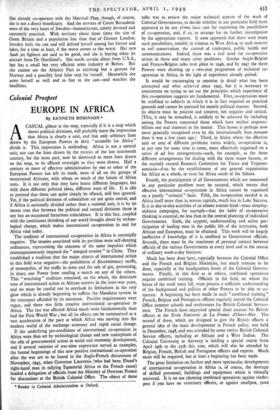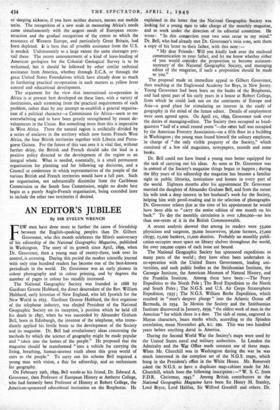Colonial Prospect
EUROPE IN AFRICA
By KENNETH ROBINSON * CASUAL gldnce at the map, especially if it is a map which shows political divisions, will probably leave the impression that Africa is clearly a unit, and that only arbitrary lines drawn by the European Powers in their " scramble for Africa " divide it. This impression is misleading. Africa is not a natural unit, nor can the lines drawn by the treaties of the late nineteenth century, for the most part, now be dismissed as mere lines drawn on the map, to be effaced overnight as they were drawn. Half a century or more of effective administration by one or other of the European Powers has left its mark, most of all on the groups of westernised Africans, with whom so much of the future of Africa rests. It is not only that they have learnt different languages, but with them different political ideas, different ways of life. It is idle to pretend that these can quite simply be effaced, still less ignored. Yet, if the political divisions of colonialism are not quite unreal, and if Africa is nationally divided rather than a national unit, it is by no means true that between the political and natural divisions there is any but an occasional fortuitous coincidence. It is this fact, coupled with the continuous shrinking of our world brought about by techno- logical change, which makes international co-operation in and for Africa vital today.
The tradition of international co-operation in Africa is essentially negative. The treaties associated with its partition were self-denying ordinances, representing the outcome of the same impulses which contemporaneously imposed the " unequal treaties " in China. They established a tradition that the major objects of international action in this field were negative—the prohibition of discriminatory tariffs, of monopolies, of the traffic in arms and the sale of gin, preventing, in short, one Power from stealing a march on any of the others. This " watchdog " tradition remained, on the whole, the dominant tone of international action in African matters in the inter-war years, and we must be careful not to overlook its limitations in the rosy glow which is already beginning to suffuse the Mandates system in the retrospect afforded by its successor. Positive requirements were vague, and there was little creative international co-operation in Africa. The last war affected Africa much more fundamentally than had the First World War ; but all its effects can be summarised as a vast acceleration of the pace at which Africa was moving into the modern world of the exchange economy and rapid social change.
If the underlying pre-conditions of international co-operation in Africa were thus set by technological change and new conceptions of the role of governmental action in social and economic development, and if several varieties of war-time experience served as examples, the formal beginnings of this new positive international co-operation after the war are to be found in 'the Anglo-French discussions of November, 1945, when Governor Laurentio (who had been Ebones right-hand man in rallying Equatorial Africa to the French cause) headed a delegation of officials from the Ministry of Overseas France for discussions at the British Colonial Office. The object of these
* Reader in Colonial Administration at Oxford. talks was to review the major technical aspects of the work of Colonial Governments, to decide whether in any particular field there appeared to be any prima facie case for examining the possibilities of co-operation, and, if so, to arrange for its further investigation by the appropriate experts. It soon appeared that there were many such possibilities, notably in relation to West Africa; in such matters as soil conservation, the control of rinderpest, public health and communications. Indeed, there was a real need for co-operative action in these and many other problems. Similar Anglo-Belgian and Franco-Belgian talks took place in 1946, and by 1947 the three Powers were drawing up a two-year programme of technical co- operation in Africa, in the light of experience already gained.
It would be encouraging to examine in detail what has been attempted and what achieved since 1945, but it is necessary to concentrate on trying to set out the principles which experience of this co-operation suggests are fundamental. First, co-operation must be confined to subjects in which it is in fact required on practical grounds and cannot be pursued for merely political reasons. Second, its objects must be positive and creative, not negative and critical. (This, it may be remarked, is unlikely to be achieved by including among the Powers concerned those which have neither responsi- bilities nor real interests in the matter. This lesson is perhaps now more generally recognised even by the internationally bien pensant than it was a few years ago.) Third, in Africa where the effective unit or area of different problems varies widely, co-operation is, at any rate for some time to come, more effectively organised on a series of ad hoc arrangements—such, for example, as the three different arrangements for dealing with the three major locusts, or the recently created Research Committee for Tsetse and Trypano- somiasis—than by the establishment of any general organisation for Africa as a whole, or even for Africa south of the Sahara.
Fourth, the participation of all Governments which are concerned in any particular problem must. be secured, which means that effective international co-operation in Africa cannot be organised on a purely " colonial " basis. Fifth, the co-operation needed is in Africa itself more than in remote capitals, much less in Lake Success. It is in day-to-day activities of an almost routine kind—mass sleeping- sickness campaigns, for example—that the habit of co-operative thinking is essential, no less than in the central planning of individual Governments. Sixth, the support, understanding and active par- ticipation of leading men in the public life of the territories, both African and European, must be obtained. This work will be largely ineffective if knowledge of it is confined to Government officials. Seventh, there must be the maximum of personal contact between officials of the various Governments at every level and in the course of ordinary work-a-day business.
Much has been done 'here, especially between the Colonial Office and the French and Belgian Ministries, but much remains to be done, especially at the headquarters levels of the Colonial Govern- ments. Finally, in this field as in others, combined operations require combined training. Officials in the field, on whom the brunt of the work must fall, must possess a sufficient understanding of the background and policies of other Powers to be able to co- operate. A beginning has been made in such "combined training." French, Belgian and Portuguese officers regularly attend the Colonial Office summer schools and conferences for British Colonial Service- men. The French have organised special short courses for British officers at the Ecole Nationale de La France d'Outre-Mer. The second of these, which are designed to give the British officers a general idea of the main developments in French policy, was held in December, 1948, and was attended by some twelve British Colonial Service officers, including an African and a West Indian. The Colonial University at Antwerp is holding a special course from April 19th to the 25th this year, which will also be attended by Belgian, French, British and Portuguese officers and experts. Much more will be required, but at least a beginning has been made.
The great limitation on further and more spectacular developments of international co-operation in Africa :s, of course, the shortage of skilled personnel, buildings and equipment which is virtually universal. It is no use planning combined operations against rinder- pest if you have no veterinary officers, or against smallpox, yaws or sleeping sickness, if you have neither doctors, nurses nor mobile un'ts. The recognition of a new scale in measuring Africa's needs came simultaneously with the urgent needs of European recon- struction and the gradual recognition of the extent to which the resources of Western Europe, and particularly Great Britain, had been depleted. it is here that all possible assistance from the U.S. is needed. Unfortunately to a large extent the same shortages pre- vail there. The recent announcement of a kind of lease-lending of American geologists for the. Colonial- Geological Survey is to be welcomed, but it should be followed by other similar technical assistance from America, whether through E.C.A. or through the great United States Foundations which have already done so much in furthering practical co-operation in such matters as yellow fever control and educational development.
The argument for the view that. international co-operation in Africa is at present best developed on these lines, with a variety of institutions, each stemming fromthe -practical requirements of each problem, rather than by any attempt to.,establish a general organisa- tion of a political character—a Commission for Africa—seem to me overwhelming and to have been greatly strengthened by recent de- velopments in the Union. But something more than this is imperative in West Africa. There the natural region is artificially divided by a series of enclaves in the territory which now forms French West Africa, the four British territories together with Liberia and Portu- guese Guinea. For the future of this vast area it is vital that, without further delay, the British and French should take the lead in a positive policy directed to the development of the region as an integral whole. What is needed, essentially, is a small permanent organisation for planning and for following up decisions, and a Council or conference in which representatives of the people of the various British and French territories would have a full part. Such an organisation, not substantially dissimilar from the Caribbean Commission or the South Seas Commission, might no doubt best begin as a purely Anglo-French organisation, being extended later to include the other two territories if desired.







































 Previous page
Previous page